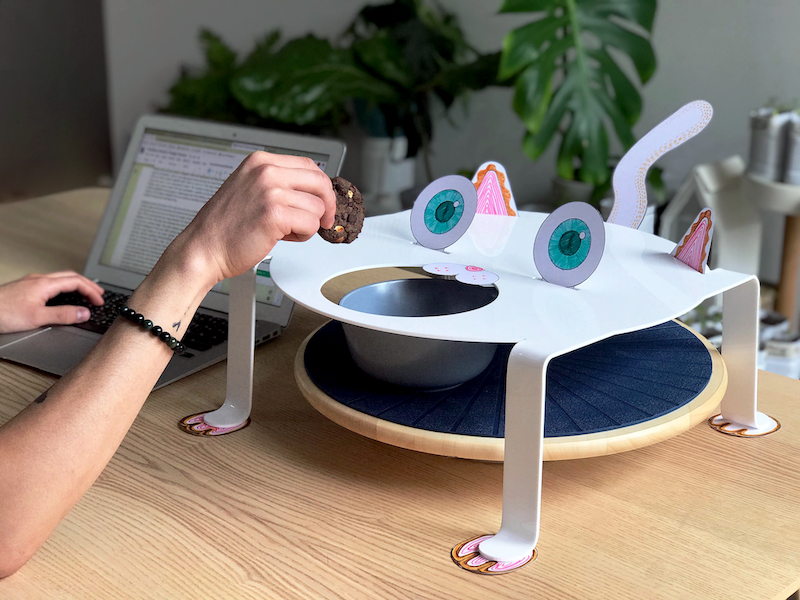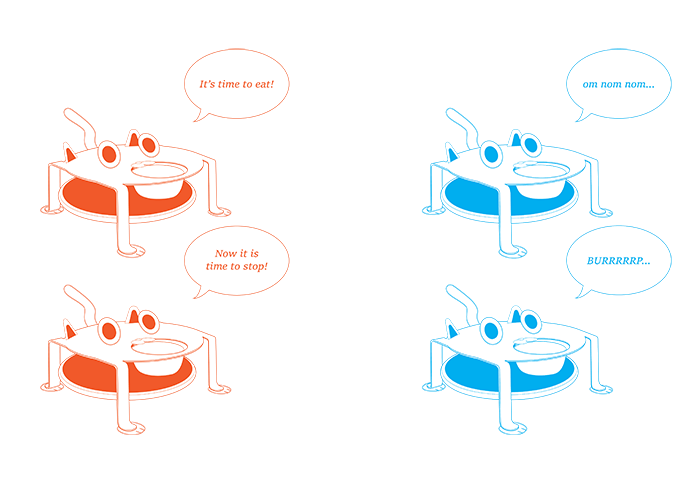
Guardian of the Snacks
Mindful Snacking Screentime Companion Human-Food InteractionEating alone can be boring, less motivating and could lead to unhealthy behaviors such as mindless snacking or skipping meals. We address the problem of unhealthy snacking practices with solo dining through a tangible multimodal companion called Guardian of the Snacks. Guardian of the Snacks is a tangible system that encourages mindful snacking by offering a playful companionship to snacking. The system is composed of two parts: (1) An automated turntable containing two bowls of the snacks; (2) A pet-shape companion, whom we refer to as a guardian that sits on top of the turntable to guard the snacks. The turntable rotates periodically to bring a snack bowl toward the user. The pet companion then invites the user’s attention by producing chewing sounds to notify the user that “it’s time to eat”. The companion makes a burping sound after a short-while to gently remind the user that “it’s time to stop eating”. The system is customizable to bear the shape of different animals and can be adapted to different snacking scenarios. Like a good companion, it encourages eating but moderates overeating through auditory feedback and playful nudging.
Made with by Rohit Ashok Khot, Jung-Ying (Lois) Yi, Deepti Aggarwal & Daniel Prohasky
Ideation
Duration: 2 monthsDesign
Duration: 3 monthsField Study
Duration: 6 monthsGuardian of the Snack in action.
Provocative.
Guardian of the Snacks gently nudges the user to adopt a healthy and mindful snacking behaviour. By healthy and mindful snacking, we refer to attentive non-judgmental consumption of healthy snacks at regular intervals but in a controlled proportion. Our work draws on prior research ,which suggests that snacking is not necessarily bad if it is done in moderation and the snack is composed of high nutrient food items like fruits and seeds. Earlier research, however, indicates that snacking is more problematic when it is unstructured and unplanned. We address this issue by bringing order to how snacks are consumed by the users. Guardian of the Snacks invites users to plan their snacking routine for the day, which includes the time interval at which they want to snack and the type of snacks they want to consume. The system does not coach or penalise the user for their snack behaviour nor does it reward for the healthy snack practice. Instead, it aims to invoke self-reflection through planning, awareness, and companionship. In doing so, this research also encourages mindful eating.
Contextual.
Guardian of the Snacks does not have any agency. Instead,
the user holds the agency from scheduling their snacking
routine to choosing their snacks. We did not enforce a
specific snack routine for the users to follow nor did we
prescribe the snack options. Instead, we allowed individuals
to decide the time they want to snack along with the snack
items they wish to consume.
The system acknowledges the difficulty of controlling
cravings for certain snack items and provides a way to
include the favourites in the snack bowls. It also
acknowledges the weak moments of users when self-control is
challenging to inhibit and does not reward or penalize for
any behaviour. Users themselves are responsible to make
goals, take necessary steps and reflect upon their
achievement. Involving the users in the planning of their
snack routine would help users to reflect on their snacking
routine as well as the snack choices.
The Guardian of the Snacks system is naive and not
intelligent. It does not utilise any intelligent algorithms
to anticipate or analyze the actions of users. The system
only offers opportunities to develop a healthy snacking
routine without judging users’ actions.
Guardian of the Snacks is a troublemaker and not a problem
solver. The system offers the snacks periodically to users
and invites them to eat, hence adding obstacles in users’
thinking of avoiding the snacks or indulging into their
favorites. It is during these moments of overcoming an
obstacle, users get to reflect on the task and their goals.

The paper is timely – situated in the context of the COVID-19 pandemic when social interaction is limited. It is also clearly written and anchored in relevant and recent literature. The innovation presented is this paper, while yet to be field-tested, seems promising and refreshing – in that it applies multimodal feedback and behavioral nudges to address the challenge of “mindless snacking” and loneliness.
Annoymous Reviewer
Multimodality and Society 2021.




